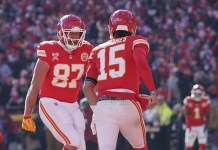Las Vegas
Amid the sale and retirement of horses, the almost hourly announcement of 2021 stud fees and coronavirus shutdowns at Golden Gate Fields and Zia Park, the New Jersey Racing Commission quietly made a significant move that could bring the sport an overdue shot of momentum. And maybe an overdose of new headaches.
The four commission members meeting in a teleconference Wednesday voted unanimously to give fixed-odds wagering a try next year. It would be on certain Grade 1 races that happen in other states between Jan. 1 and Dec. 31. Races like the Kentucky Derby, Preakness, Belmont Stakes and the Breeders’ Cup championships.
“It would bring benefits to the sports-wagering operators,” executive director Judith Nason told the commission. “To a certain extent the revenue can be shared, and some of it can be directed for purse money.”
That all sounds fine and good, but according to Thoroughbred Daily News, which monitored Wednesday’s commission meeting, Nason had to do some arm-twisting. She was helped by the bipartisan momentum of a more permanent bill going through the New Jersey legislature, which is on the verge of authorizing fixed-odds wagering on as many races in and out of state as bookmakers desire.
As New Jersey is wont to do, there has been some dragging of feet for seemingly no good reason. As Drazin put it, “We’ve been hung up for six months on whether or not a wager on a horse race is a sports bet or a horse-racing bet, because they’re handled differently. The proposed legislation says it’s a horse-racing bet.”
Semantics – or pedantics – aside, there is an overriding issue here that goes to the heart of the current business model of U.S. racing, namely pari-mutuel wagering. In countries like the U.K. and Australia, where both types of betting are done side by side at every racetrack, fixed odds came first. The pari-mutuel system was built around it, not vice-versa. Racetracks were getting their cut from private bookmakers long before they were establishing takeout rates.
Trying to install such a system now is like establishing rapid transit in cities where the car came first. Good luck breaking that pattern.
A big concern is that racing dollars represent a zero-sum game. The money that private bookmakers take in on fixed-odds bets would theoretically come out of the handle that had been the exclusive domain of the pari-mutuel pools. The racetracks could see their revenue reduced, unless they made the right deals with the likes of William Hill and FanDuel. Monmouth Park and the Meadowlands got into bed long ago with those two, so they may be simultaneously insulated and conflicted.
Without a dog in the New Jersey fight, The Stronach Group’s Aidan Butler has seen these economic dynamics from all angles. Before he became a track executive, he worked his way up in racing with entry-level jobs as a bookmaker’s apprentice in his native England.
Asked late last year why the U.S. could not copy the U.K. and have fixed odds and pari-mutuels at the same time, Butler said, “It needs a fundamental restructuring of how the industry works, because everything is powered by pari-mutuel wagering. The way takeout is split up pays for everything from purses to stable workers.”
Think about the sea change it would cause. For the good it would put an end to worrying about that last click on the tote board, where too often a bet that looks like value at 6-1 turns into a 7-2 underlay just as the horses reach the first turn. Conversely, smart bettors who see a small overlay in the bookmakers’ ring on a horse that is being faded might get bigger value in the pari-mutuels.
“In the early days, it will have a minimal impact,” Drazin said. “But five years down the road a significant portion of the handle will be fixed odds.”
Where private bookmakers would welcome that new revenue stream, their risk management could also leave the current racing establishment at their mercy. As it stands, tracks get an average of 15-20 cents of every dollar bet. Fixed-odds operators cutting into that monopoly could create an uncertain bottom line – and maybe a whole new challenge to replace that revenue.
“We’d need a lot more bloody sponsors,” Butler said. “You really have to put an emphasis on branding and sponsorship for the big days, which we do well in England. But the little days you open up a little bit of a can of worms.”
Butler said it is not just about covering expenses. It is also about policing the oddsmakers to be sure they are on the up and up.
“We really need to look at the trustworthiness and the sanctity of the sport,” he said. “One of the best things about pari-mutuel is it’s a poll. You can see fluctuation, and you can see where the money is. That’s a lot harder to do when it’s fixed odds.”
Doesn’t that sound a lot like sports betting? It is regulated. Bookmakers in that business not only put their risk on display every day, they also have to report profits and losses that are made public en masse through state gaming commissions. Maybe that is why the legislature in Trenton cannot get its arms wrapped around whether fixed odds are just another way of saying sports betting.
“The pilot (fixed-odds) program would be regulated by the Division of Gaming Enforcement,” Nason said. “DGE has the authority to regulate fixed-odds wagers.”
The devil is in those details, and they do not end at the Delaware River. Just ask DraftKings Sportsbook’s Johnny Avello, who tried last year to resurrect the renowned Kentucky Derby futures that he established in his 13 years at Wynn Las Vegas. Three days after he posted them at the Scarlet Pearl Casino Resort in Mississippi, he was forced by Churchill Downs Inc. to take them down. He no longer enjoyed the grandfathered acceptance of such a market in Nevada.
Drazin warned commission members that the same thing could happen in New Jersey.
“I would ask you to just consider what you’re going to do if one track – let’s say Churchill Downs – decides they’re going to authorize fixed odds on the Kentucky Derby, but they’re not going to give it to anybody else except to Churchill (and its Twin Spires wagering platform) which operates online in New Jersey. Do you think that would have a negative impact on the rest of us?”
As welcome as fixed-odds markets would be for bettors, they would clearly create a whole new set of economic challenges for an industry that really does not need any more of these headaches.
As commission member Michael Arnone put it before he reluctantly voted yes, “I get the feeling like we’re the good monsignor getting called up to give last rights to the pari-mutuel system.”
In other words, bettors, be careful what you wish for.
Ron Flatter’s racing column is available every Friday morning at VSiN.com and more frequently during coverage of big races, including. You may also hear the Ron Flatter Racing Pod at VSiN.com/podcasts. A legendary columnist from New Jersey, a seasoned bookmaker from Las Vegas and the late Hall of Famer from Louisville are on the current episode of the RFRP. Jerry Izenberg tells stories of his 70 years covering big races and other sports. South Point’s Chris Andrews handicaps weekend races. There is also an archived interview with the late Paul Hornung. The Ron Flatter Racing Pod is available for download and free subscription at Apple, Google, iHeart, Spotify, Stitcher and at VSiN.com/podcasts. It is sponsored by 1/ST BET.





